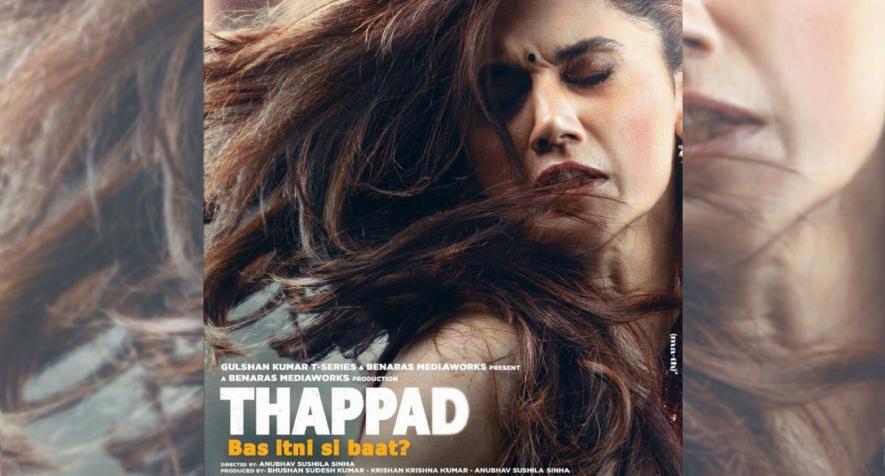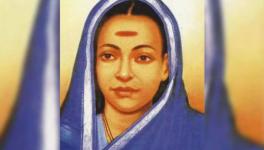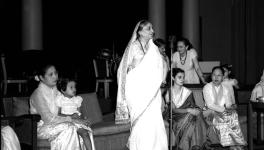Thappad: Love and Dignity go Hand-in-Hand

Just last fortnight, the romcom Shubh Mangal Zyada Savdhan sparked conversations in Indian middle-class homes on love and the spectrum of sexuality. Now Anubhav Mishra’s Thappad is here to dissect patriarchy. His tool is the not-so-visible, and yet pervasive, iniquity that defines Indian marriages. The film poster features Taapsee Pannu being is struck by her husband (next to the title). It needs to mince no words. The purpose is communicated unequivocally and, one can say that the film has come just in time. The intention is to shame the brazen patriarchal injustice that persists in marital relationships, and it succeeds.
Mishra does not resort to the established methods of commercial cinema to shore up popularity and profitability. In short, there is no dance-and-music number in the film. Thankfully, there is no sexist or misplaced humour either, of the kind that had plagued SMZS. Viewers will be tempted to consider this a coming-of-age film for Indian social cinema. The film is very clear about it: when it comes to something as visceral and devastating as domestic violence, it cannot be sugar-coated or diluted to make it more ‘accessible’.
The film’s steering team has followed an atypical PR strategy by propagating and amplifying their core message through creative means such as the derisive ekkees thappadon ki salaami (or a 21-slap salute) to patriarchy.
The film-makers’ painstaking effort has been to broaden the understanding of domestic violence. The fraught is denied the protection of public taboo and the wheels of its operation are exposed across social status. Domestic violence transcends the class of the perpetrator, their age, their relative power and the degree of closeness between the victim and the perpetrator.
Following a classic narrative of interlinked stories about women from different socio-economic and cultural standpoints, the characters unite in how agitated and annoyed they feel about their status in their married relationships. The inequality at the heart of heterosexual marriages forms the basis for the main plot, which revolves around Amrita (played by Taapsee Pannu). She is awakened from the relationship she had sought a false sense of relief in by a thappad—slap. Amrita has been a ‘devoted housewife’, but after this slap is planted on her, in public, something snaps.
Mishra brings up the ubiquitous invisibilisation of women’s lived experiences and the hardships they face in everyday life with the simple ploy of a slap. The social realities of women, their stories and the iniquitous decisions of families that they must bow to, unquestioningly, are laid bare. By emphasising that domestic violence is not limited to just physical harm, say in the form of a ‘neutral’ exercise of physical strength in a fit of rage, the movie shows that violence of any kind diminishes self-respect and dignity. Violence suppresses the individual on its receiving end, in particular when it is gendered exercise of power.
A compelling case is made for not trivialising women’s experiences or justifying their oppression through lazy excuses that prioritise the stability and continuation of the family unit, the reputation of a family or the well-being of other relatives, over a woman’s life. Amrita negotiates each of these challenges, while the other characters either represent the forces of patriarchy or come up against it in their own way.
Amrita concludes that divorce is the most “correct” solution in her circumstances and approaches lawyer-activist Netra Jaisingh, played by Maya Sarao. Netra herself is in the grips of an identity crisis, partly fuelled by her cavalier husband. Netra’s husband appropriates her skills and achievements by habitually crediting her success to himself—either his own social capital or to his father’s standing.
Thappad is a scathing attack on the ‘raja beta’ syndrome, which has allowed men to treat women as house help. It urges the audience to introspect and act. Taking a step forward from Ki and Ka, the film has showed consideration for the painstaking home-bound routines that women are tied to, from which they can rarely digress. The notion that “women are so difficult to understand” is blasted through the roof. It is the men, thanks to patriarchy, who refuse to take their knowledge and feelings into account. The point is simple: everybody deserves respect and love in a relationship and one of these two is never enough.
To depict the gore of domestic violence, Mishra and Mrunmayee Lagoo leverage the story of Amrita’s help, the sole breadwinner in her family. She deals with violence by gamifying it. For her, ignorance is literally bliss. Despite financial constraints she refuses to accept the pseudo-benevolent salary hike given by her employer simply because he slapped her ‘madam’. Dia Mirza plays a successful single mother unafraid when rejecting a nefarious request from her neighbour, made in front of her young daughter.
The devil is patriarchy, which has been deeply ingrained in the upbringing of every character. It has made them oblivious to the injustice that they inflict on themselves and each other. Snippets of conversations between reel-life father Kumud Mishra and reel-life mother Ratna Pathak Shah bring out the lament, regret and helplessness that this injustice foments. Mishra’s character take every opportunity he can to redeem the debt—be it giving an earful to his son when he disrespects his wife, supporting his daughter and standing up for his wife’s dreams.
Ultimately, the film’s central message of equality, dignity and self-respect marks a clear departure from Kabir Singh’s premise that emotional and physical subordination are acceptable manifestations of ‘love’. Mishra recites Ramdhari Singh ‘Dinkar’ in the climax; one can only hope that the audiences will not remain blind to the iniquities of patriarchy that are practised in every home.
Prannv Dhawan is a third-year law student at NLSIU, Bangalore. Bhavya Arora is a student of Hansraj College, Delhi University. The views are personal.
Get the latest reports & analysis with people's perspective on Protests, movements & deep analytical videos, discussions of the current affairs in your Telegram app. Subscribe to NewsClick's Telegram channel & get Real-Time updates on stories, as they get published on our website.
























